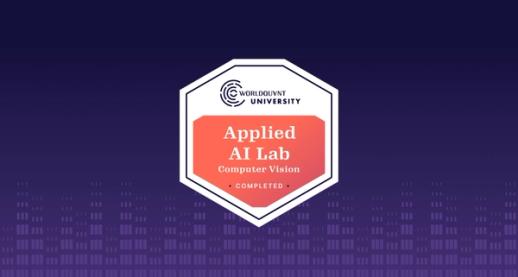Computer Vision: The Perfect Gateway to Deep Learning

At WorldQuant University, we are committed to making quality education accessible to global talent, empowering learners to expand their opportunities and drive change in their communities. This commitment includes expanding our programmatic offering to advance the skills development learners need to meet evolving market demands. In that pursuit, we are proud to announce the launch of our new Applied AI Lab: Deep Learning for Computer Vision.
Computer vision stands out as one of the most accessible and impactful applications of deep learning with its use of neural networks to interpret complex visual data. Its ability to address real-world problems makes it the ideal starting point for those ready to master artificial intelligence. Beyond its use in specialized roles such as computer vision engineering, AI research, and robotics development, these skills are increasingly valuable in healthcare, where medical imaging aids diagnostics; agriculture, for monitoring crop health; and security, with applications in surveillance and biometrics.
Deployed on a virtual machine platform, our self-paced Applied AI Lab uses computer vision as a hands-on framework for building essential deep learning skills. Through 6 real-world projects ranging from detecting crop diseases in Uganda and monitoring traffic in Bangladesh, students learn to clean and transform visual data, train custom computer vision models, and apply advanced techniques like transfer learning. By the end of the program, students will be equipped with end-to-end computer vision skills, from data preparation to model deployment, ready to tackle challenges across industries.
Deep learning for computer vision is interdisciplinary, combining tools from computer science, mathematics, and artificial intelligence. To thrive in this program, learners should have working knowledge of Python, including experience with data manipulation libraries like NumPy and Pandas. Comfort with linear algebra concepts such as matrices and vectors, as well as fundamental calculus concepts like derivatives, is essential. Familiarity with machine learning concepts like supervised and unsupervised learning will provide a strong foundation for tackling advanced computer vision tasks.
If you’re just beginning your AI learning journey, consider starting with foundational training and exploring our Applied Data Science Lab to build the skills needed for success in the AI Lab.
You will graduate from the AI Lab with a sharable portfolio of projects and be equipped with end-to-end computer vision skills, from data preparation and ETL processes to model development and deployment, enabling you to solve real-world challenges across industries. Whether creating facial recognition systems, developing object detection models, or leveraging AI for sustainable agriculture, you’ll be ready to solve real-world challenges with confidence and responsibility.
Ready to join? Get started right away to develop the in-demand skills of today’s marketplace! Sign up today.



